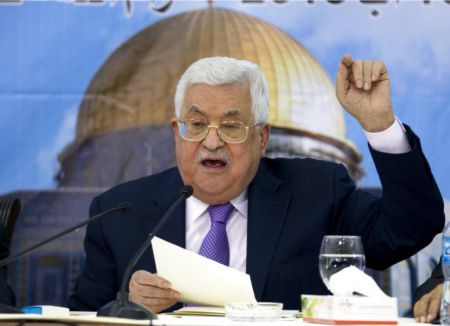 WASHINGTON – The United States announced it was halting funding for the United Nations’ agency for Palestinian refugees Friday after declaring the organization was “irredeemably flawed.
WASHINGTON – The United States announced it was halting funding for the United Nations’ agency for Palestinian refugees Friday after declaring the organization was “irredeemably flawed.
Washington has long been the U.N. Relief and Works Agency’s (UNRWA) largest donor but is “no longer willing to shoulder the very disproportionate share of the burden,” State Department spokeswoman Heather Nauert said in a statement.
Nauert said there would be no additional contributions beyond a $60 million dollar payment made in January, drawing condemnation from both the Palestinians and UNRWA.
“The United States will no longer commit further funding to this irredeemably flawed operation,” Nauert added.
There have been widespread warnings about the impact of a halt to funding from the U.S., which contributed $350 million to UNRWA’s budget last year.
“We reject and condemn this American decision in its entirety,” chief Palestinian negotiator Saeb Erekat said in a statement, calling on all countries “to reject this decision and to provide all possible support” to UNRWA.
UNRWA also slammed the U.S. decision, dismissing Nauert’s characterization of the agency.
UNRWA “expresses deep regret and disappointment at the US’ announcement that it will no longer provide funding to the Agency after decades of staunch political and financial support,” spokesman Chris Gunness wrote on Twitter.
“We reject in the strongest possible terms the criticism that UNRWA’s schools, health centers, and emergency assistance programs are ‘irredeemably flawed,’ ” he said.
U.N. Secretary General Antonio Guterres said that UNRWA has his “full confidence,” calling on “other countries to help fill the remaining financial gap, so that UNRWA can continue to provide this vital assistance.”
The agency supports some 5 million registered Palestinian refugees and provides schooling for 526,000 children in the Palestinian territories as well as in camps in Lebanon, Syria and Jordan.
Fears over funding have already led to warnings from UNRWA that it may have to permanently shut all the 711 schools that it runs after recent temporary closures.
And while there was some relief for the agency on Thursday when Germany said it would provide additional funding, UNRWA’s director Pierre Krahenbuhl said earlier this week that the agency needs $200 million to continue its work until the end of this year.
The United States also announced last week that it was canceling more than $200 million in bilateral aid to Palestinians in Gaza and the West Bank.
Nauert said the U.S. would “intensify dialogue with the United Nations, host governments, and international stakeholders about new models and new approaches” to help alleviate any impact on Palestinian children.
“We are very mindful of and deeply concerned regarding the impact upon innocent Palestinians, especially school children, of the failure of UNRWA and key members of the regional and international donor community to reform and reset the UNRWA way of doing business,” she added.
The Palestinian ambassador to Washington, Hossam Zomlot, had earlier said that the U.S. would be guilty of “reneging on its international commitment and responsibility” if reports that funding was to end were confirmed.
“By endorsing the most extreme Israeli narrative on all issues including the rights of more than 5 million Palestinian refugees, the U.S. administration has lost its status as peacemaker and is damaging not only an already volatile situation but the prospects for future peace,” Zomlot said in a statement.
Israel and the United States have both accused UNRWA of perpetuating the Israel-Palestinian crisis by maintaining the idea of the right of return — that Palestinians will be able to return to the homes from which they fled.
And both governments say the U.N. as whole is biased against Israel, pointing to its long history of votes in the General Assembly against the Jewish state.
The Palestinian Authority has refused all contact with Washington since U.S. President Donald Trump announced late last year that he was unilaterally recognizing Jerusalem — which is claimed by both Israel and the Palestinians — as the Israeli capital, making the U.S. one of very few countries to do so.
The Palestinians were further enraged by the opening of the U.S. Embassy in Jerusalem on May 14, which was attended by Trump’s son-in-law Jared Kushner, who has been tasked with trying to revive the essentially moribund Middle East peace process.
Kushner has publicly questioned Palestinian president Mahmoud Abbas’ willingness to make concessions to secure peace.
Palestinian officials have countered that the Trump administration has come up with “nothing of substance” in trying to end the decades-old conflict despite the U.S. president’s stated confidence of securing what he calls “the ultimate deal.”
In this Aug. 15, 2018 photo, Palestinian President Mahmoud Abbas addresses the top decision-making body the Palestinian Central Council, at his headquarters in the West Bank city of Ramallah. The United States is ending its decades of funding for the U.N. agency that helps Palestinian refugees, State Department announced Friday, a week after slashing bilateral U.S. aid for projects in the West Bank and Gaza. (AP Photo/Majdi Mohammed)
Sources: One America News Network. and TheJapanTimes